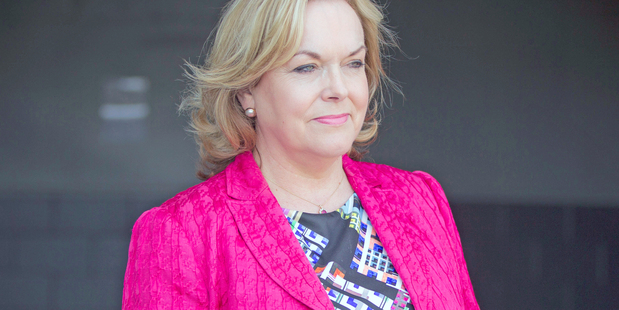 Ms Collins is naive if she believes the actions and comments of a Cabinet minister will not be used by the company to promote its products. Photo / Michael Craig
Ms Collins is naive if she believes the actions and comments of a Cabinet minister will not be used by the company to promote its products. Photo / Michael Craig
Judith Collins has brusquely rejected claims that visiting her husband's dairy company in China represented a conflict of interest. She had simply been assisting New Zealand Inc, as ministers were expected to do whenever they were overseas, she said. The Prime Minister lent support, saying the Cabinet Office had stated unequivocally that there had been no breach of Cabinet Manual rules. On that count, it may appear nothing untoward had occurred. If only it were so simple.
At best, the Justice Minister's actions during a visit to the offices of Oravida, a New Zealand company that exports milk products to China, were naive, careless and unwise. A translation of a Chinese-language report on the company's website says she tried Oravida's milk and "praised" it. Tackling this arena, the Cabinet Manual says: "No minister should endorse, in any media, any product or service."
According to the Cabinet Office, however, Ms Collins' comment does not mean she endorsed Oravida's product.
Such incidents happened all the time, added the Prime Minister. "I go to a lot of things where I say I use your toilet paper, or whatever it might be, that's not deemed to be an endorsement."
Maybe so, but Ms Collins was naive if she believed the actions and comments of a Cabinet minister would not be used by the company to promote its products. Worse, this was not just any company. Ms Collins' husband, David Wong Tung, is a director, and Oravida donated more than $55,000 to the National Party in 2011. A cash cow.
A minister's role is a public one, and "appearances and propriety can be as important as an actual conflict of interest". In that context, Ms Collins' visit to Oravida smacks of carelessness.
The lack of wisdom implicit in her visit is underlined by other parts of the Cabinet Manual. It notes that public perception is very important. Ministers, it says, are responsible for ensuring no conflict of interest exists or appears to exist between their personal interests and their public duty. A minister's role is a public one, and "appearances and propriety can be as important as an actual conflict of interest". In that context, Ms Collins' visit to Oravida smacks of carelessness.
It is the more so given the fate in this Government's time of other ministers who demonstrated a similarly blase attitude. In 2009, Internal Affairs Minister Richard Worth received a "bollocking" from the Prime Minister for promoting an aviation company in which he had an interest during a private visit to India. Only a year later, another Cabinet minister, Pansy Wong, also paid a price for blurring the boundaries. While in China, she witnessed a deal her husband helped to arrange between a Rotorua hovercraft firm and a Chinese investor, signing herself as a Government minister. Eventually, after strong criticism, she resigned her portfolios for a lesser misjudgment - the misuse of an overseas air travel perk.
When dealing with Dr Worth, John Key said he expected ministers to work out potential conflicts of interest themselves. The Cabinet Manual makes the same point. But Ms Collins' only concession has been to ask Oravida to remove any references to her visit that breached the manual. If that request carries its own admission, she has been, otherwise, utterly unapologetic. Typical of her attitude was the comment, "I drink milk, shock horror I drink milk".
This country has a culture of honesty in public life. It should not be taken for granted, however. Cabinet ministers play an important part in upholding that culture. Indeed, they should endorse it at every opportunity. Ms Collins' unwillingness to acknowledge even that her action could be perceived as inappropriate hardly does that. The public simply has to ask the obvious question: Would she have gone out of her way to visit and talk up any other Kiwi exporter of dairy products while she was on unrelated ministerial business in China? Unlikely.
- NZ Herald